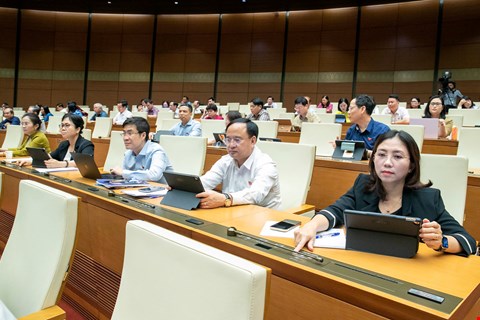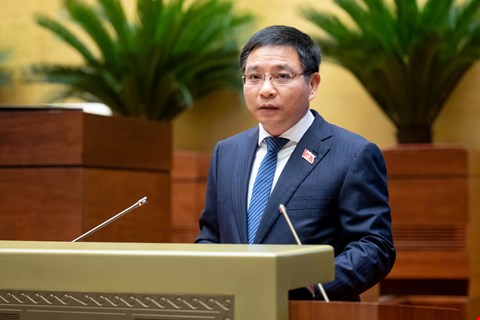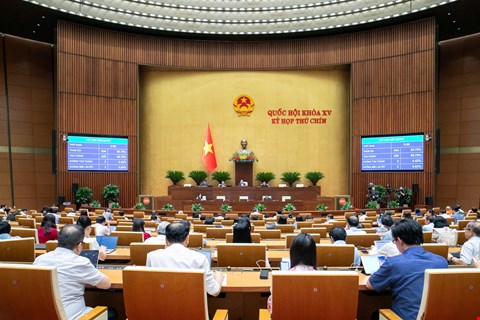Continuing the 9th session, on May 17, authorized by the Prime Minister, Minister of Finance Nguyen Van Thang presented the Report on receiving, explaining and revising the draft Resolution of the National Assembly on mechanisms and policies for private economic development.

With 429/434 National Assembly deputies pressing the button in favor (accounting for 89.75% of the total number of deputies), the Resolution on private economic development mechanisms and policies was officially approved.
The subjects of application of the Resolution are enterprises, business households, business individuals and other relevant organizations and individuals.
Abolish contract tax for business households from January 1, 2026
According to the draft Resolution submitted to the National Assembly for approval this morning (May 17), the drafting agency assessed that the abolishment of contract tax on business households is a very correct policy of the Party and State to ensure transparency of business household operations, create equality in tax regimes between business households and enterprises, and encourage business households to convert to enterprises.
In response to the opinions of National Assembly deputies on promoting the implementation of this policy, the draft Resolution has adjusted the time to apply the elimination of contract tax for business households and individuals from January 1, 2026, instead of July 1, 2026 as in the previous Draft.
At the same time, to reduce the cost burden and encourage business households and individuals to transform digitally, the draft Resolution stipulates that the State allocates funding to provide free digital platforms and shared accounting software for business households.
Small and medium-sized enterprises are exempt from tax in the first 3 years
The Resolution stipulates the exemption of corporate income tax for a period of 2 years and a reduction of 50% of the tax payable for the next 4 years for income from innovative start-up activities of innovative startups, creative startup investment fund management companies, and intermediary organizations to support innovative startups.
The determination of tax exemption and reduction period is implemented in accordance with the provisions of the law on corporate income tax.
At the same time, the National Assembly decided to exempt personal income tax and corporate income tax on income from transfer of shares, contributed capital, right to contribute capital, right to buy shares, right to buy capital contributed to creative startups.
In addition, personal income tax is exempted for a period of 2 years and the tax payable for the next 4 years is reduced by 50% on income from salaries and wages of experts and scientists received from innovative startups, research and development centers, innovation centers, and innovation support intermediaries.

Notably, the National Assembly decided to exempt corporate income tax for small and medium enterprises for 3 years from the date of issuance of the first Business Registration Certificate.
Not rectifying legal regulations to handle disadvantages for businesses
According to the Resolution, the responsibilities of individuals and entities; criminal and civil, and administrative responsibilities to citizens in handling violations are clearly defined.
Civil and economic measures are prioritized for cases of civil and economic violations. Enterprises, households and individuals doing business are proactive in overcoming violations and damages.
For violations that are beyond criminal prosecution, priority will be given to proactive, timely and comprehensive remedial measures and will be an important basis for the prosecution agency to consider when deciding to prosecute, investigate, prosecute, try and subsequent handling measures.
The legal remedies are not allowed to be applied to handle disadvantages for businesses, business households, and individuals.
Ensure that the sealing, temporary detention, and freezing of assets related to incidents and cases must comply with the authority, order, procedures, scope, and not infringe upon the legitimate rights and interests of organizations and individuals...

The number of inspections and checks (including inter-sectoral inspections) for businesses, households and individuals doing business is a maximum of once a year, except in cases with clear signs of violations; direct inspections and digital transformation applications, prioritizing inspections based on electronic data.
Enterprises and business households that comply with legal regulations are exempted from on-site inspection.
Draft the National Assembly's Resolution on mechanisms and policies for private economic development to institutionalize the Party's policies stated in Resolution No. 68-NQ/TW on private economic development.
This Resolution consists of 7 chapters and 17 articles, effective from the date of approval by the National Assembly - May 17.











